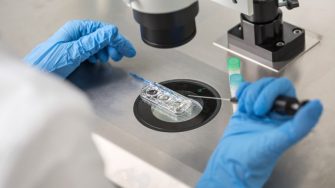
Our lab is interested in understanding the cellular and molecular processes involved in the regulation of epithelial cell biology and how the breakdown of this regulation leads to pathogenesis of disease such as Cystic Fibrosis.
We have developed an Australian national biobank of stem-cell-derived airway and gut organoids, and have built a platform for high-throughput therapy-testing on patients' organoids. We combine our strengths in organoid disease modelling, multi-omic molecular profiling and computational research with clinical data to improve individualised outcomes for patients with CF.
Cystic Fibrosis (CF) is the most common inherited disease in Australia. Patients endure a life of debilitating symptoms resulting from pathology which begins prior to birth. This is despite advances in therapies which have improved symptom relief by targeting the underlying molecular defect – the CF Transmembrane Regulator (CFTR) protein. We have implemented a state-of-the-art organoid-based functional precision drug screening platform and established CF airway and gut organoid biobank resource (from >200 CF patients). This ground-breaking platform has allowed the full characterisation patients with common CFTR mutations and those with ultra-rare CFTR variants, acting as a personalised care model and identifying those that would otherwise not have access to life-saving targeted drugs.
Our goals
- Adult stem cell derived epithelial organoids generated from the lung and gastrointestinal tract as tools for drug discovery in cystic fibrosis and PCD.
- The role of epithelial stem cells in tissue regeneration in the lung and gastrointestinal tract.
- Gene and stem cell therapy for cystic fibrosis
- Developing functional assays for translational medicine using the human adult stem cell technology
Research Strengths
- Stem cell biology
- Organoid technology
- Functional assays
- High content microscopy
- Electrophysiology
Our results
- Adult stem cell-derived organoids (“mini-me”’s) can now be routinely generated from tissue resident stem cells. These advanced cell models can be reproducibly generated for biobanking, scaled up in cost effective ways for use in drug screens to predict patient response and guide individual treatment.
- The miCF laboratory has created a biobank of airway and intestinal organoids from approx. 200 people with cystic fibrosis (CF), a lethal genetic disease characterised by substantial genetic and clinical heterogeneity.
- We have developed a state-of-the-art high-throughput organoid-based functional precision drug screening platform (CF-Avatar) that is used to characterise patients with common or ultra-rare CFTR mutations, identifying those that would otherwise not have access to life-saving targeted drugs (Ideas Grant 2020-2023) ) which subsequently attracted funding from MRFF to facilitate embedding the CF-Avatar platform into the Health system.
- The critical nature of our CF Avatar platform is evident by its citation by the 2021 Parliamentary Inquiry into new drug approvals to help reform the Health Technology Assessment Pathway for new therapies in rare disease.
- In 2020, we advanced airway organoids for COVID-19 research and the miCF laboratory collaborated with the Doherty Institute’s vaccine initiative, and CSIRO to understand and develop treatment strategies for long COVID.
- With the right support, we believe the organoid technology can facilitate rapid, bench-to-bedside translational research that makes a life-saving and life-changing difference to patients and their families.



